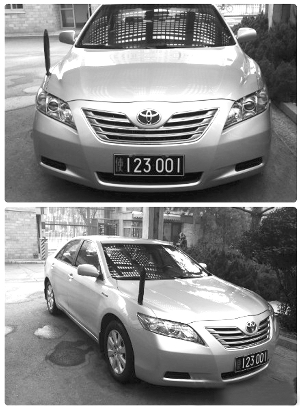By Will Bland

Canada’s Globe and Mail on Monday carried guidelines on how to judge wealthy Chinese by the cars that they drive – the Audi A6 is for bureaucrats, the Buick minivan is for bosses who can’t afford Mercedes and Humvees belong to the offspring of top government officials.
As a study in how brands convey status in China, the car observations are less enlightening than Peter Hessler’s description of how his neighbor switched cigarette packets to reflect his attitudes to different visitors, but I’m always keen for an excuse to prejudge Chinese according to what they wear, eat, watch or drive.
Mark Mackinnon’s own excuse to draw consumer profiles came courtesy of the Canadian ambassador to Beijing, who put up photos of his official car online, prompting a thousand Chinese to post comments on the embassy’s microblog.
Mackinnon quotes from two of those posts, whose authors seem in awe at the modesty of the Canadian foreign office. This response made me wonder whether it’s Canada’s policy to draw attention to its government’s frugality, and whether, by doing so, ambassador David Mulroney had also intended to highlight the extravagance of many Chinese officials.
Given how carefully diplomats pick their words in public and the speed at which comments spread across the Chinese blogosphere, Mulroney is in the wrong profession if he didn’t anticipate the Chinese response.
More probably, the Canadian Department of Foreign Affairs and International Trade believes that engaging with China's 400 million Internet users is a useful way to help achieve its foreign policy aims.
Similarly, as well as reminding its own citizens living in Beijing that their life expectancy diminishes with each breath, the U.S. embassy’s air pollution tracker encourages Chinese citizens to pressure their own government to limit pollution. That pressure serves U.S. foreign policy objectives, and getting Chinese citizens to put the case is probably far more than effective getting Americans to do it.
Fortunately for the U.S. and Canada, it’s not easy for Chinese commentators to caricature diplomats' opposition to pollution and corruption as signs of western imperialism.
Westerners, however, are savvier to the use of soft power, particularly when non-democracies such as China try their hand.
This was clear from Monday’s edition of the Daily Telegraph, which reported on the Mystery of Cambridge University’s £3.7 million Chinese benefactors.
The grant, which comes from the Chong Hua Foundation, is going to fund a new Chair of Chinese Development, which will be occupied by Professor Peter Nolan who already teaches at the university. The Telegraph was unable to find records of Chong Hua in China, but cites a Cambridge spokesman saying that the foundation isn’t linked to the Chinese government and that Professor Nolan won’t be barred from discussing delicate issues such as Tibet.
In an ideal world, academics wouldn’t depend on anyone to fund their research and would be free to follow their instincts; instead they mostly have to rely on grants, endowments and subsidies.
Even so, the world’s fastest growing economy is obviously a subject worth researching, and if people from that country will pay foreign universities to research it then so much the better.
If their £3.7 million buys biased research that is condemned by Nolan’s peers then it's not just a waste of money, but also a serious misunderstanding of soft power.
However, Professor Nolan’s Cambridge colleagues are disparaging a large proportion of China scholars if they think Nolan’s integrity can be dismissed on the basis of his remark to a British parliamentary committee that the Communist Party of China is “a very capable organization and it has got more and more capable.”
By complaining about Chinese grants, they’re also overlooking other sources of funding that can compromise an academic’s impartiality.
“Soft corruption” on the part of high-placed western economists was one of the main lines of attack by Charles H. Ferguson in Inside Job, his 2010 documentary on the financial crisis. Commenting on the film, Nobel laureate Paul Krugman wrote of his profession that “you get paid a lot of money by the financial industry, you get put on boards, but only if you don’t rock the boat too much. Besides, you hang out with these people, and get assimilated by the financial Borg.”
At least Professor Nolan is unlikely to be schmoozed in the back of Audi A6s during his tenure in Cambridge.
